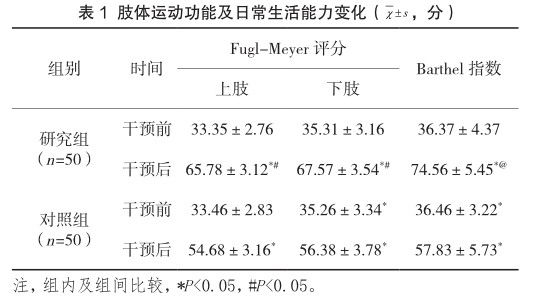分阶段康复护理对脑卒中后偏瘫患者运动功能的影响


打开文本图片集
【摘 要】目的:探讨分阶段康复护理对脑卒中后偏瘫患者运动功能的影响。方法:100例脑卒中后偏瘫患者采用随机数字表法均分为两组,各50例,对照组接受常规康复护理,研究组接受分阶段康复护理,比较两组的肢体运动功能及日常生活能力变化、干预后的生活质量及护理满意度。结果:干预后,研究组的Fugl-Meyer评分(上肢+下肢)和对照组相比有了显著的升高,并且Barthel指数也是升高的(P
【关键词】分阶段康复护理;脑卒中后偏瘫;运动功能;生活质量
Effect of staged rehabilitation nursing on motor function of patients with hemiplegia after stroke
WANG Huili
Shangzhen Central Health Center, Shangluo, Shaanxi 726207, China
【Abstract】Objective: To explore the effect of staged rehabilitation nursing on the motor function of patients with hemiplegia after stroke. Methods: 100 patients with post-stroke hemiplegia were divided into two groups by random number table method, each with 50 cases. The control group received routine rehabilitation care, and the study group received staged rehabilitation care. The motor function and daily life ability of the two groups were compared. Change, quality of life after intervention, and nursing satisfaction. Results: After the intervention, the Fugl Meyer score (upper limbs + lower limbs) of the study group was significantly higher than that of the control group, and the Barthel index was also higher(P
【Key?Words】staged rehabilitation nursing; hemiplegia after stroke; motor function; quality of life
脑卒中是因急性脑血管循环障碍使局部脑组织出现局灶性功能缺损所致的一种脑血管疾病,近年来,我国的医疗技术发展取得了较大的进步,因而发生脑卒中死亡的概率已经有了一定程度的减少,但实践证实,大多脑卒中性存在进入康复期后常伴有偏瘫症状,会给患者的运动和日常生活带来较大的影响,若未进行积极有效的康复护理则可导致运动功能丧失,使生活质量急剧下降[1]。(剩余3453字)